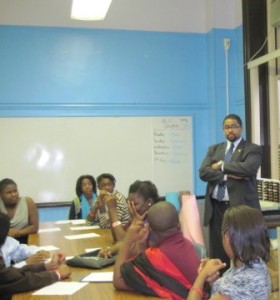What inspires young teens to do well in school?
The admission from President Obama that he wasn’t always a perfect student really struck a chord with 6th – 9th graders as they watched the President’s 3rd Annual Back-to-School speech on Sept. 28 in Chicago.
“I was really surprised when he said that he wasn’t the best student in middle school,” said Maurice, an 8th grader at Ryerson Elementary School, where he joined a small group of other students and educators from Ryerson and Gage Park High School to watch the address and participate in a follow-up discussion.
“I always thought that to be President, you’d have to be the smartest student in your school. He wasn’t, but he became the hardest worker,” he said, sparking vigorous nods from students around him.
“My parents are always telling me that they want me to have more opportunities than they had. That inspires me,” said Dyanne, a 6th- grader.
While several teens echoed that positive response, a few others said that drug dealing and other negative influences in their neighborhoods are what drive them to succeed in school.
“I want more for myself. I want to graduate from high school and college. I think that if I put all of my efforts into school, I can be anything I want to be,” said DeAndre, a 6th grader.
The students also had plenty of suggestions for making class time more inspiring:
- One said that there was no free time in his school day, making him often wish that he could “fast forward” through some classes.
- Others wished their teachers would try new ways of teaching material to make classes more interesting, and to better reach kids who don’t all learn at the same pace.
- Several teens, concerned about plans for a longer school day in Chicago Public Schools, hoped that the extra time would include art and music classes.
Ryerson’s Dexter Chaney II — one of ED’s 2011-2012 Classroom Teaching Ambassador Fellows (TAF) – urged his students to draw on inspiration from within themselves.
“You need to be committed to being successful,” said Chaney, who was joined by Gage Park teacher Xian Barrett, a 2009-2010 TAF. “You need to take risks, and you need to be more involved with the world around you. Most young people don’t believe that their thoughts and ideas can make a difference, but they can.”
Click here to read more about President Obama’s back-to-school speech.








Many teens in the area that i live in seem to have no drive for anything it seems. It might be the households that they are raised in. These kids seem to have no interest in anything. I think a lot of parents these days fail to be parents.
It was nice to read how some are inspired and that is great. My personal view is that inspiration should start in the home and at an early age. After all children look to their parents as examples. Rich, poor and parents who are well educated, or not, can all set a positive example.
I find one of the most inspiring things often is honesty. For a president to share a so-called imperfection and yet to have risen to be President, is far more inspiring and motivating than to hear a speech from someone who has always got straight As. Personally, I think it is never about the marks – it’s the passion and curiosity and willingness to keep on trying, finding new a different ways to succeed, that is the all-important factor. Real education is about embracing our failures and using them to come up with new solutions, rather than being shackled and labelled by them. As a fitness enthusiast, I also can’t emphasize enough the need to exercise the body along with the mind. Whether you pull on your running shoes and head out across the park for awhile, or hop on your indoor exercise bike and get in a quick 20 minutes of interval training in between studying. Or, in the case of kids, just go out and play. It will make a world of difference to how well you learn.